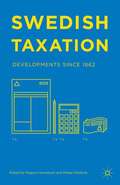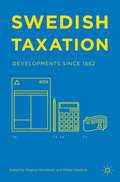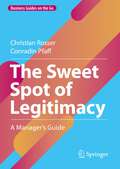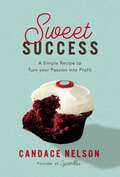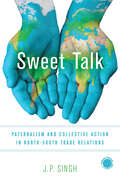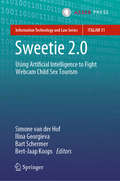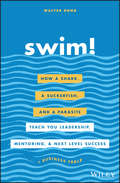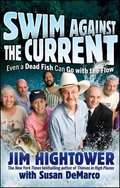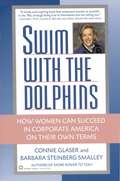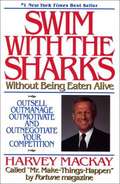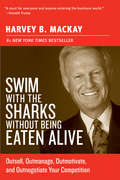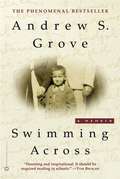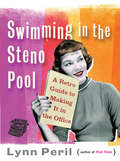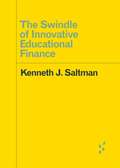- Table View
- List View
Swedish Economic Thought: Explorations and Advances
by Lars JonungThe impact of Swedish economists on the development of modern economic analysis has been profound. This volume contains twelve essays dealing with various aspects of the development of economics and economic thought from the mid 18th century to the middle of the 20th century. Most of the essays cover the golden age of Swedish economics, the early decades of the 20th century, and deal with such figures as Knut Wicksell, Gustav Cassel, Eli Heckscher, Bertil Ohlin, Erik Lindahl and Erik Lundberg.The book includes a chapter on an unpublished manuscript of Knut Wicksell's which is reproduced in English for the first time
Swedish Economists in the 1930s Debate on Economic Planning (Palgrave Studies in Economic History)
by Benny CarlsonThe 1930s, characterised by repercussions from World War I and the Great Depression, was an era of populism, nationalism, protectionism, government intervention and attempts to create planned economies. The perceived need for economic planning emerged in Sweden in part due to the increasing political strength of the Social Democrats and their evolution from a party hampered by Marxist fatalism to a pragmatic mass movement. The Swedish debate continued beyond World War II and is still relevant to today’s economic crises, which have resulted in a demand for action coming from below (populism) and above (elitism).Carlson surveys the arguments for and against economic planning as they were put forward by leading Swedish economists in the 1930s, with a focus on the thoughts of Gustav Cassel, Eli Heckscher, Gösta Bagge, Gunnar Myrdal and Bertil Ohlin, among others. In so doing he provides a timely exploration of the debate on the necessary and desirable extent of state intervention in market economies.
The Swedish Takeover Code: An annotated commentary
by Rolf Skog Erik SjömanThe Swedish Takeover Code was first published in the 1970s, with the UK City Code serving as a model. However, the 2011 overhaul of the City Code implemented changes in the UK which brought the City Code closer to the Swedish approach, particularly in regards to procedures surrounding the announcement of offers and possible offers. Available for the first time in English, this book is the leading commentary on the Swedish Takeover Code. Written by members of the Swedish Takeover Panel, who have been directly involved in the recent overhauls of the code, it is a vital reference for any companies, lawyers, bankers, financial regulators or policy makers participating in mergers and acquisitions involving Swedish stakeholders.
Swedish Taxation: Developments since 1862
by Magnus Henrekson Mikael StenkulaBy taking the long view on the evolution of this country's tax policies through the past few decades, Henrekson and Stenkula explain how Sweden developed the highest tax-to-GDP ratio in the world, until the beginning of the 2000s.
A Sweeping Vision: Real World Strategies for Observing Team Dynamics, Evaluating Outrageous Targets, and Developing Effective Interview Protocols
by Patricia Gorman Clifford Jay Barney"What I Didn't Learn in Business School" is a fictional account that follows new consultant Justin Campbell as he joins an elite team hired by a chemical firm to assess the potential of a newly developed technology. Consulting, as many recent MBA graduates learn, is more than analyzing data and cracking cases. In this chapter, Justin learns some important lessons about working with different personalities, developing plans for client interviews that yield revealing results, and weighing risk and reward to manage audacious goals. Authors Jay Barney and Trish Gorman Clifford demonstrate through Justin's struggles that in the real world, strategy development does not happen by analysis alone--it requires listening, sharing, and asking the tough, insightful questions that will help you grasp organizational complexities and determine the best course of action given the circumstances. This chapter was originally published as Chapter 7 of "What I Didn't Learn in Business School: How Strategy Works in the Real World."
Sweet Deal -- Industry Self-Regulation of Breakfast Cereal Advertising To Children
by Dennis Yao Felix Oberholzer-Gee Britta Kelley Lizzie GomezIn response to growing concern about childhood obesity, in February 2006 the Council of Better Business Bureaus (CBBB) announced an initiative to examine its self-regulatory program on children's advertising. The existing program was a voluntary cross-industry program that monitored advertisements directed to children. However, the program did not stipulate which products companies could or could not advertise to children. In response to calls for action on childhood obesity, the CBBB was considering a number of approaches, including revising children's advertising guidelines, but staying within the basic parameters of the current program. Alternatively, the CBBB was considering launching a new self-regulatory program in which participating firms would constrain the amount of their children-targeted advertising of less-nutritious products. It was widely believed that children's food advertising was a major contributor to childhood obesity, and within the food-advertising category, considerable attention was directed to advertisements of children's presweetened cereals. The major ready-to-eat (RTE) cereal manufacturers, such as Kellogg's and General Mills, were supporters of the CBBB self-regulation programs and were invited to participate in the CBBB initiative. Each manufacturer had been taking different individual approaches to address the concerns of childhood obesity. The case discussion focuses on what actions General Mills should take with respect to the CBBB initiative and on its own.
The Sweet Life
by Dulce Candy RuizThe YouTube star and beauty guru shares her hard-won lessons on success, style, and finding the sweetness in all aspects of your life. Since posting her first makeup tutorial in 2008, Dulce Candy has become one of the top beauty stars on YouTube, boasting more than 2 million subscribers and garnering hundreds of millions of views of her bright and energetic videos. But before she became a style icon and a role model to millions of young women, Dulce struggled to make her way in the world. Having emigrated with her family from Mexico to the United States when she was six years old, Dulce battled depression and low self-esteem as a teenager and eventually enlisted in the army in an attempt to turn her life around. It was here, on the battlefields of Iraq, that she finally uncovered and embraced her true passion--fashion and beauty--and gained the confidence to move on from her past, follow her dream, and launch what would become her wildly successful brand. The Sweet Life chronicles Dulce Candy's inspiring story, showing that anyone can be successful no matter their background and sharing the hard-won lessons that helped transform her from a shy, self-doubting teenager into a confident business woman and beauty expert. According to Dulce, you can't live the sweet life until you accept who you are--flaws and all--and take chances--knowing that failure is just a part of learning and fear is a sign that you're trying something new and exciting. Drawing on anecdotes from her own life and career, Dulce offers advice on building a personal brand ("Know what makes you different"), building confidence ("Fake it till you make it") and balancing the personal and the professional ("Don't settle when you settle down"). She also emphasizes the importance of both inner and outer beauty, encouraging women to love themselves, ignore the critics, and flaunt their own original style. Part memoir, part manifesto, The Sweet Life is a fun, inspirational guide for any woman who wants to find success and happiness without compromising who she is.From the Hardcover edition.
The Sweet Spot of Legitimacy: A Manager’s Guide (Business Guides on the Go)
by Christian Rosser Conradin PfaffThis book provides an overview of legitimacy-related challenges at hybrid organizations and demonstrates legitimacy’s importance for the strategic development of organizations. In a reader-friendly way, it addresses the question of how hybrid organizations can gain legitimacy from the perspectives of key stakeholders. To do so, the book examines legitimacy management in the context of two real-world hybrid organizations – the Swiss Institute for Translational and Entrepreneurial Medicine and the Swiss Center for Design and Health in Bern, Switzerland – from both theoretical and practical perspectives. It shows why the systematic combination of three types of legitimacy has the potential to optimize the level of legitimacy in emerging hybrids, contributing to their success. It also explains how organizational legitimacy can be operationalized using governance legitimacy, purpose-rational legitimacy, and value-rational legitimacy.This book equips managers and executives working at hybrid organizations with useful guidance and hands-on strategic tools to develop legitimacy management strategies. It also offers a source of inspiration for academic research and teaching in this field.
Sweet Success: A Simple Recipe to Turn your Passion into Profit
by Candace NelsonLEARN THE RECIPE FOR STARTING A SUCCESSFUL BUSINESSFor the first time ever, founder of Sprinkles cupcakes, Candace Nelson, is sharing the recipe for success in her new book, Sweet Success. She will walk you through the steps she took to build a globally beloved brand, so you can do it too. Although she deals in frosting, there&’s no sugarcoating here. Candace pushes back the kitchen door to reveal mistakes, misses, and lessons learned the hard way. Readers will learn how to:Obtain the key ingredients to any successful businessCraft the mindset of an entrepreneurLearn the secret recipe for packaging a product for profitTurn kitchen experiments into top selling productsCultivate a community of brand evangelistsStep into a personal brand to amplify the businessKnow where to put marketing dollars most effectivelyAnd much more. In a time of unprecedented disruption and innovation, people are rethinking career and professional purpose. It&’s never been a better time to start a business. Sweet Success dispels the myth that entrepreneurship is reserved for an elite few and is a must-read for anyone with a passion needing a place to start or a push along the way.At a career crossroads, instead of going to business school like her peers, Candace Nelson reflected on what she really wanted to do—and did what nobody, including Candace herself, would have expected. She poured her passion and life savings into creating the world&’s first cupcake bakery. Today, Sprinkles Cupcakes and its Cupcake ATMs have become a globally recognized brand, celebration mainstay and inspiration for entrepreneurs everywhere.
Sweet Talk: Paternalism and Collective Action in North-South Trade Relations
by J. P. SinghDeveloped nations strive to create the impression that their hearts and pockets bleed for the developing world. Yet, the global North continues to offer unfavorable trade terms to the global South. Truly fair trade would make reciprocal concessions to developing countries while allowing them to better their own positions. However, five hundred years of colonial racism and post-colonial paternalism have undermined trade negotiations. While urging developing countries to participate in trade, the North offers empty deals to "partners" that it regards as unequal. Using a mixed-methods approach, J. P. Singh exposes the actual position beneath the North's image of benevolence and empathy: either join in the type of trade that developed countries offer, or be cast aside as obstreperous and unwilling. Singh reveals how the global North ultimately bars developing nations from flourishing. His findings chart a path forward, showing that developing nations can garner favorable concessions by drawing on unique strengths and through collective advocacy. Sweet Talk offers a provocative rethinking of how far our international relations have come and how far we still have to go.
Sweet Tyranny: Migrant Labor, Industrial Agriculture, and Imperial Politics (The Working Class in American History)
by Kathleen MapesIn this innovative grassroots to global study, Kathleen Mapes explores how the sugar beet industry transformed the rural Midwest by introducing large factories, contract farming, and foreign migrant labor. Identifying rural areas as centers for modern American industrialism, Mapes contributes to an ongoing reorientation of labor history from urban factory workers to rural migrant workers. She engages with a full range of individuals, including Midwestern family farmers, industrialists, Eastern European and Mexican immigrants, child laborers, rural reformers, Washington politicos, and colonial interests. Engagingly written, Sweet Tyranny demonstrates that capitalism was not solely a force from above but was influenced by the people below who defended their interests in an ever-expanding imperialist market.
Sweetie 2.0: Using Artificial Intelligence to Fight Webcam Child Sex Tourism (Information Technology and Law Series #31)
by Simone van der Hof Ilina Georgieva Bart Schermer Bert-Jaap KoopsThis book centres on Webcam Child Sex Tourism and the Sweetie Project initiated by the children’s rights organization Terre des Hommes in 2013 in response to the exponential increase of online child abuse. Webcam child sex tourism is a growing international problem, which not only encourages the abuse and sexual exploitation of children and provides easy access to child-abuse images, but which is also a crime involving a relatively low risk for offenders as live-streamed webcam performances leave few traces that law enforcement can use. Moreover, webcam child sex tourism often has a cross-border character, which leads to jurisdictional conflicts and makes it even harder to obtain evidence, launch investigations or prosecute suspects.Terre des Hommes set out to actively tackle webcam child sex tourism by employing a virtual 10-year old Philippine girl named Sweetie, a so-called chatbot, to identify offenders in chatrooms. Sweetie 1.0 could be deployed only if police officers participated in chats, and thus was limited in dealing with the large number of offenders. With this in mind, a more pro-active and preventive approach was adopted to tackle the issue. Sweetie 2.0 was developed with an automated chat function to track, identify and deter individuals using the internet to sexually abuse children. Using chatbots allows the monitoring of larger parts of the internet to locate and identify (potential) offenders, and to send them messages to warn of the legal consequences should they proceed further.But using artificial intelligence raises serious legal questions. For instance, is sexually interacting with a virtual child actually a criminal offence? How do rules of criminal procedure apply to Sweetie as investigative software? Does using Sweetie 2.0 constitute entrapment? This book, the outcome of a comparative law research initiative by Leiden University’s Center for Law and Digital Technologies (eLaw) and the Tilburg Institute for Law, Technology, and Society (TILT), addresses the application of substantive criminal law and criminal procedure to Sweetie 2.0 within various jurisdictions around the world.This book is especially relevant for legislators and policy-makers, legal practitioners in criminal law, and all lawyers and academics interested in internet-related sexual offences and in Artificial Intelligence and law.Professor Simone van der Hof is General Director of Research at t he Center for Law and Digital Technologies (eLaw) of the Leiden Law School at Leiden University, The Netherlands. Ilina Georgieva, LL.M., is a PhD researcher at the Faculty of Governance and Global Affairs at Leiden University, Bart Schermer is an associate professor at the Center for Law and Digital Technologies (eLaw) of the Leiden Law School, and Professor Bert-Jaap Koops is Professor of Regulation and Technology at the Tilburg Institute for Law, Technology, and Society (TILT), Tilburg University, The Netherlands.
Sweetness and Power: The Place of Sugar in Modern History
by Sidney W. Mintz"Shows how the intelligent analysis of the history of a single commodity can be used to pry open the history of an entire world of social relationships and human behavior."-The New York Review of Books.
sweetriot 2.0
by Donna Khalife Bobbi Thomason Christopher MarquisIn the fall of 2010, Sarah Endline, CEO and Founder of sweetriot, an organic chocolate company, was deciding the best way to grow her organic chocolate company, while keeping her chocolate physically and conceptually on the shelf. She wanted to grow the offerings and profits of her company, while maintaining its social mission and unique flair. The case tracks the origins of sweetriot from Sarah's formative early career experiences, to the company's launch and beyond as Sarah prepares future products, establishes production channels, and seeks future funding. Sarah was not content to just be a small New York City candy company. Her goal was for sweetriot to be the number one natural chocolate company in the world and to thus be a vehicle to drive change globally. How can she meet that objective while also keeping the company true to its social roots?
SweetWater
by Thomas D. Everett H. Kent BowenFocuses on developing a promising idea into a viable product design by considering customer needs early in the design process. Following an Alaskan fishing trip, Sandy Platter, a computer peripherals engineer, has a new idea for a portable water-filter device for use by outdoor recreationalists.
Swim!: How a Shark, a Suckerfish, and a Parasite Teach You Leadership, Mentoring, and Next Level Success
by Walter BondA fascinating story about the power of networking, connection, and mentorship Written as an engaging parable, Swim! How a Shark, a Suckerfish, and a Parasite Teach You Leadership, Mentoring, and Next Level Success brings to life real-world challenges (and their solutions) and presents them in simple, yet powerful terms. The book explores the vital importance of networking, explores the steps that lead to successful networking, and explains why we need it. Swim! dives deep into the concepts of mentorship and the power of human connection. While too many business leaders spend their time obsessing about facts, figures, and the bottom line, it is more important for them to learn to manage relationships. Once attention shifts to relationships, businesses and careers can reach the next level of success. Written by a leading motivational speaker, this book offers ideas that can be applied to both personal and business life. Understand the importance of establishing habits and rituals Tap into the power of a positive mindset Discover the value of teamwork Learn to use intentional language about workplace culture Swim! is an entertaining book that highlights the significant concept of connecting and building relationships and includes the tools needed to become more self-aware about our roles and contributions in our industries.
Swim Against the Current: Even a Dead Fish Can Go with the Flow
by Jim Hightower Susan DemarcoHightower is most often called a populist, but he just shrugs it off and starts pointing out features of the real world that the rich and powerful would rather people did not notice. Here he and co-conspirator Susan DeMarco present vignettes of how once-ordinary people are fighting corruption and injustice in business, politics, and life, often by providing an alternative to the mainstream. Annotation ©2008 Book News, Inc., Portland, OR (booknews.com)
Swim with the Dolphins: How Women can Succeed in Corporate America on their Own Terms
by Connie Glaser Barbara Steinberg SmalleyBased on interviews with female managers, and featuring helpful charts and lists, this intelligent blueprint for managerial achievement presents new techniques for success in corporate America that rely on traditional "feminine" strengths--nurturing, caring, motivating and other characteristics that empower managers and help employees thrive.
Swim with the Sharks without Being Eaten Alive
by Harvey MackayMackay offers dozens of tips on how to outsell, outmanage, outmotivate, and outnegotiate other people in any field of human endeavor.
Swim with the Sharks Without Being Eaten Alive
by Harvey B. MackayThis straight-from-the-hip handbook by bestselling author and self-made millionaire Harvey Mackay spells out the path to success for readers everywhere. They will learn how to: Outsell by getting appointments with people who absolutely, positively do not want to see you, and then making them glad they said "yes!" Outmanage by arming yourself with information on prospects, customers, and competitors that the CIA would envy - using a system called the "Mackay 66." Outmotivate by using his insights to help yourself or your kids join the ranks of Amercia's one million millionaires. Outnegotiate by knowing when to "smile and say no" and when to "send in the clones." This one-of-a-kind book by a businessman who's seen it all and done it all has sold almost 2 million copies, and is the essential roadmap for everyone on the path to success.
Swim with the Sharks Without Being Eaten Alive
by Harvey B. MackayThis straight-from-the-hip handbook by bestselling author and self-made millionaire Harvey Mackay spells out the path to success for readers everywhere. They will learn how to: Outsell by getting appointments with people who absolutely, positively do not want to see you, and then making them glad they said "yes!"Outmanage by arming yourself with information on prospects, customers, and competitors that the CIA would envy - using a system called the "Mackay 66."Outmotivate by using his insights to help yourself or your kids join the ranks of Amercia's one million millionaires.Outnegotiate by knowing when to "smile and say no" and when to "send in the clones."This one-of-a-kind book by a businessman who's seen it all and done it all has sold almost 2 million copies, and is the essential roadmap for everyone on the path to success.
Swimming Across: A Memoir
by Andrew S. GroveSwimming Across is a personal and cultural memoir tracing Andrew Grove's most formative years. Beginning on the eve of Nazi Germany's invasion of his native Hungary and ending with his flight from communism to America 16 years later, it combines a child's sense of wonder with an engineer's passion for order and detail. Grove's uplifting autobiography depicts his family's struggle to survive in the face of a host of staggering obstacles. Nearly killed by scarlet fever at the age of four, forced into hiding by the Nazis in 1944, and dogged by anti-Semitism, Andrew Grove's survival was nothing short of miraculous. In Swimming Across, a true American hero reveals his origins and what it takes to survive... and to triumph.
Swimming in the Steno Pool: A Retro Guide to Making It in the Office
by Lynn PerilFeed your boss’s ego. Dress for success. And don’t let your heels trip you up on the corporate ladder. Millions of women have held the position of secretary, alternately lauded as a breakthrough opportunity and excoriated as dead-end busy work. From the female pioneers who infiltrated Capitol Hill offices during the Civil War to today’s tech-savvy administrative assistants, secretaries have withstood criticism for abandoning their rightful sphere (the home), weathered the dubious advice of secretarial guide-books, taken hits from feminists and antifeminists alike, and demanded the right to resist making coffee—all while making their bosses look good. In Swimming in the Steno Pool, author-secretary Lynn Peril profiles the various incarnations of the secretary, from pliable, sexy mate of the "office husband" to postfeminist executive-in-training, drawing inspiration from a wide range of "femorabilia" and secretarial guidebooks of yesteryear. Featuring an array of fabulous illustrations promoting office equipment and office girls alike, Peril delivers a feisty, witty celebration of the women who’ve been running the show for decades.
The Swindle of Innovative Educational Finance (Forerunners: Ideas First)
by Kenneth J. SaltmanHow “innovative” finance schemes skim public wealth while hijacking public governanceCharter school expansion. Vouchers. Scholarship tax credit programs. The Swindle of Innovative Educational Finance offers a new social theory to explain why these and other privatization policies and programs win support despite being unsupported by empirical evidence. Kenneth J. Saltman details how, under the guise of innovation, cost savings, and corporate social responsibility, new and massive neoliberal educational privatization schemes have been widely adopted in the United States. From a trillion-dollar charter school bubble to the Chan Zuckerberg Initiative to celebrities branding private schools, Saltman ultimately connects such schemes to the country’s current crisis of truth and offers advice for resistance. Forerunners is a thought-in-process series of breakthrough digital works. Written between fresh ideas and finished books, Forerunners draws on scholarly work initiated in notable blogs, social media, conference plenaries, journal articles, and the synergy of academic exchange. This is gray literature publishing: where intense thinking, change, and speculation take place in scholarship.



